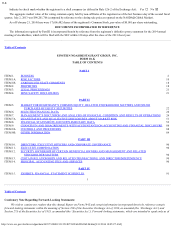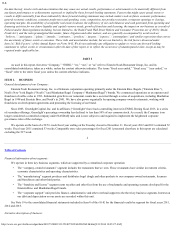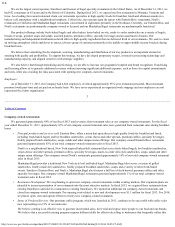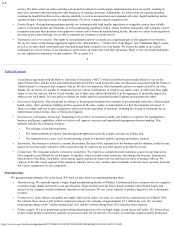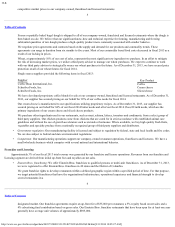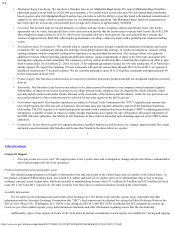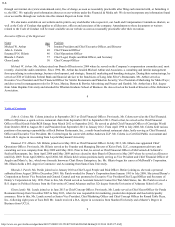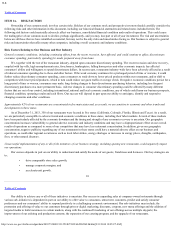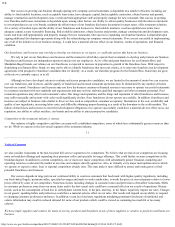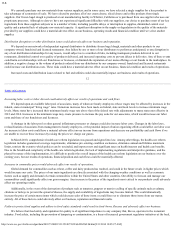Einstein Bros 2013 Annual Report Download - page 12
Download and view the complete annual report
Please find page 12 of the 2013 Einstein Bros annual report below. You can navigate through the pages in the report by either clicking on the pages listed below, or by using the keyword search tool below to find specific information within the annual report.
10-K
http://www.sec.gov/Archives/edgar/data/949373/000119312514073832/d629623d10k.htm[9/11/2014 10:05:27 AM]
state and federal levels.
Failure to protect our food supply or enforce food safety policies, such as proper food temperatures and adherence to shelf life dates, could
result in food-borne illnesses and/or injuries to our guests. Also, our reputation of providing high quality food is an important factor in our guests
choosing our restaurants. Whether or not traced to our restaurants or those of our competitors, instances of food borne illness or other food safety
issues could reduce demand for certain or all of our menu offerings. If any of our guests become ill from consuming our products, the affected
restaurants may be forced to close and we may be subject to legal liability. An instance of food contamination originating from one of our
restaurants, our suppliers, or our manufacturing
13
Table of Contents
plant could have far-reaching effects, as the contamination, or the perception of contamination could affect substantially all of our restaurants.
Publicity related to either product contamination or recalls may also injure our brand and may affect the selection of our restaurants by guests,
franchisees and licensees based on fear of such illnesses. In addition, the occurrence of food-borne illnesses or food safety issues could also
adversely affect the price and availability of affected ingredients, which could result in disruptions in our supply chain and/or lower margins for us
and our franchisees and licensees.
We face the risk of adverse publicity and litigation in connection with our operations.
We are from time to time the subject of complaints or litigation from our consumers alleging illness, injury or other food quality, health or
operational concerns. Adverse publicity resulting from these allegations may materially negatively affect us and our brand, regardless of whether
the allegations are valid or whether we incur any liability. In addition, third party and employee claims against us based on, among other things,
alleged discrimination, harassment or wrongful termination, or labor code violations may divert financial and management resources that would
otherwise be used to benefit our future performance. There is also a risk of litigation from our franchisees and licensees. We have been subject to a
variety of these and other claims from time to time in the past and a significant increase in the number of these claims or the number that are
successful could materially adversely affect our business, prospects, financial condition, operating results or cash flows.
We occupy our company-owned restaurants under long-term non-cancelable leases, and we may be unable to renew leases at the end of their
lease periods or obtain new leases on acceptable terms.
We do not own any real property, and all of our company-owned restaurants are located in leased premises. Many of our current leases are
non-cancelable and typically have terms ranging from five to ten years with two three- to five-year renewal options. We believe leases that we
enter into in the future will also likely be long-term and non-cancelable and have similar renewal options. Most of our leases provide that the
landlord may increase the rent over the term of the lease, and require us to pay our proportionate share of the cost of insurance, taxes, maintenance
and utilities. If we close a restaurant, we generally remain committed to perform our obligations under the applicable lease, which would include,
among other things, payment of the base rent for the balance of the lease term. In some instances, we may be unable to close an underperforming
restaurant due to continuous operation clauses in our lease agreements. Our obligation to continue making rental payments in respect of leases for
closed or underperforming restaurants could have an adverse effect on our business and results of operations.
If we are unable to renew our restaurant leases, we may be forced to close or relocate a restaurant, which could subject us to construction and
other costs and risks, and could have a material adverse effect on our business and results of operations. For example, closing a restaurant, even
during the time of relocation, will reduce the sales that the restaurant would have contributed to our revenues. Additionally, the revenue and profit,
if any, generated at a relocated restaurant may not equal the revenue and profit generated at the prior location. We also face competition from both
restaurants and other retailers for suitable sites for new restaurants.
Our operations may be negatively impacted by seasonality, adverse weather conditions, natural disasters or acts of terror.
Our business is subject to seasonal fluctuations, as well as adverse weather conditions and natural disasters that may at times affect regions
in which our company-owned, franchised and licensed restaurants are located, regions that produce raw ingredients for our restaurants, or locations
of our distribution network. As a result of the seasonality of our business and our industry, our quarterly results have varied in the past, and we
believe that our quarterly operating results will vary in the future. In addition, if adverse weather conditions or natural disasters such as fires and
hurricanes affect our restaurants, we could experience closures, repair and restoration costs, food spoilage, and other significant reopening costs as
well as increased food costs and delayed supply shipments, any of which would adversely affect our business. We could also experience shortages
or delayed shipments at our restaurants if adverse weather or natural disasters affect our distribution network, which could adversely affect our
restaurants and our business as a whole. Additionally, during periods of extreme
14


